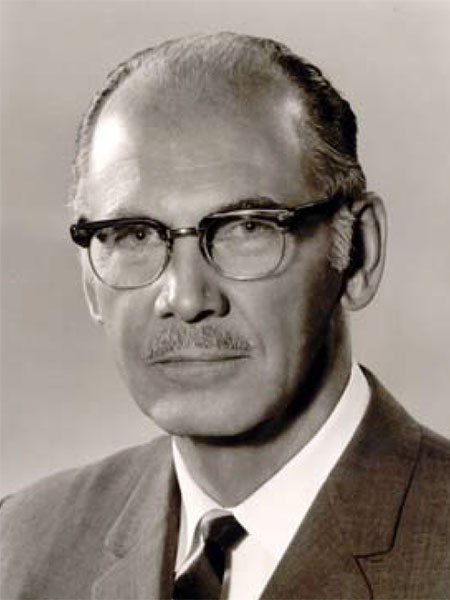 |
Philip Markus Pétursson
|
Cleric, MLA (1966-1969), MLA (1969-1973), MLA (1973-1977).
Born at Roseau, Minnesota on 21 October 1902, one of ten children of Olafur Pétursson and Annie Azelia McNab (c1884-1960), when he was eight months old, he moved with his family to Foam Lake, Saskatchewan where they operated a store, and again nine years later to Winnipeg. Although his memories of his childhood in Saskatchewan were hazy, he recalled a few early experiences which did not suggest his future career in the clergy. When his class was asked who among them would give their hearts to Jesus, Petursson declined because he felt ‘he needed it himself.’
After graduating high school, he studied at the Winnipeg Normal School and for a year at the University of Manitoba. He taught school for three years, at Lavallee School (1924-1926), but he was proud of the experience and felt it served him well in his future career in the clergy and politics. After studies at the University of Chicago, he was called to be the minister of All Souls Unitarian Church in Winnipeg in 1929, and five years later, he was invited to become the minister of the First Federated Church of Unitarians, usually simply called the Unitarian Church of Winnipeg. From then until retirement, he would use English during the morning service and Icelandic for the evening service.
Petursson was well-known for opening his pulpit to progressive guests such as J. S. Woodsworth, Joe Zuken and Stanley Knowles and championing controversial causes, such as opposing public finding for private and parochial schools in the 1950s. He was a leader in the establishment of the Funeral Planning and Memorial Society of Manitoba. His religious inclinations may have been summed up in a 1942 radio broadcast, in which he said that “Religion must become more human centered - more humanistic generally - and must concern itself more with saving men’s souls by giving them an abundant life here, instead of continually calling on them to repent sins into which they have too often been driven by social and economic wrongs, which we permit to exist within the social order”.
In 1943, he was named Regional Director for Western Canada by the American Unitarian Association, and in that role he helped guide the transition of the United Conference of Icelandic Churches into becoming the Western Canada Unitarian Conference. In 1942, Peterson was elected to the Winnipeg School Board, and remained there until 1951, when he was appointed to the Winnipeg Municipal Hospital Commission. He twice ran for Parliament, in 1949 and 1965, but failed to win both times. In 1966, however, he was elected to the Legislative Assembly of Manitoba for Wellington, and was re-elected in 1969 and 1973. From 1969 to 1971, he was the Minister of Cultural Affairs, overseeing Manitoba’s centennial celebrations.
He was married twice, first on 25 September 1926 to Thorey Gislason (1903-1978) at Winnipeg. They had two children: Anne Petursson (?-1957) and Philip Petursson (wife Helen). He later married nurse Kathleen Merle Bowyer (1910-1996).
He was President of the Icelandic National League of North America and helped to establish an Icelandic department at the University of Manitoba, as well as amalgamating Winnipeg’s two Icelandic newspapers to form Lögberg-Heimskringla. He also served with the Welfare Council, Family Bureau and the Canadian Mental Health Association. In 1952, he received the Knight Cross of the Order of the Falcon, the highest honor given by the Icelandic government, and received an honorary Doctor of Divinity degree from his alma mater, Meadville Theological School. In 1977, he received a Queen Elizabeth II Silver Jubilee Medal.
He died at Winnipeg on 12 May 1988 and was buried in the Brookside Cemetery.
Marriage registration [Philip Markus Petursson, Thorey Gislason], Manitoba Vital Statistics.
Birth registration [Kathleen Bowyer], Manitoba Vital Statistics.
“Future cabinet ministers, their past and present,” Winnipeg Free Press, 9 July 1969, page 26.
Obituary [Thorey Petursson], Winnipeg Free Press, 10 May 1978, page 208.
“Rev. Philip M. Petursson, DD.” by Rev. Stefan M. Jonasson, Icelandic Unitarians, http://members.shaw.ca/icelandic-unitarians/My_Homepage_Files/Page3.html [Internet Archive, 4 March 2014].
Obituary, Winnipeg Free Press, 14 May 1988, page 49.
Obituary [Kathleen Merle Petursson], Winnipeg Free Press, 29 December 1996, page 54.
We thank Nathan Kramer for providing additional information used here.
This page was prepared by Kris Keen and Gordon Goldsborough.
Page revised: 9 April 2025
Memorable Manitobans
This is a collection of noteworthy Manitobans from the past, compiled by the Manitoba Historical Society. We acknowledge that the collection contains both reputable and disreputable people. All are worth remembering as a lesson to future generations.
Search the collection by word or phrase, name, place, occupation or other text:
Custom SearchBrowse surnames beginning with:
A | B | C | D | E | F | G | H | I | J | K | L | M | N | O | P | Q | R | S | T | U | V | W | Y | ZBrowse deaths occurring in:
1975 | 1976 | 1977 | 1978 | 1979 | 1980 | 1981 | 1982 | 1983 | 1984 | 1985 | 1986 | 1987 | 1988 | 1989 | 1990 | 1991 | 1992 | 1993 | 1994 | 1995 | 1996 | 1997 | 1998 | 1999 | 2000 | 2001 | 2002 | 2003 | 2004 | 2005 | 2006 | 2007 | 2008 | 2009 | 2010 | 2011 | 2012 | 2013 | 2014 | 2015 | 2016 | 2017 | 2018 | 2019 | 2020 | 2021 | 2022 | 2023 | 2024 | 2025
Send corrections and additions to this page
to the Memorable Manitobans Administrator at biographies@mhs.mb.caCriteria for Memorable Manitobans | Suggest a Memorable Manitoban | Firsts | Acknowledgements
Help us keep
history alive!